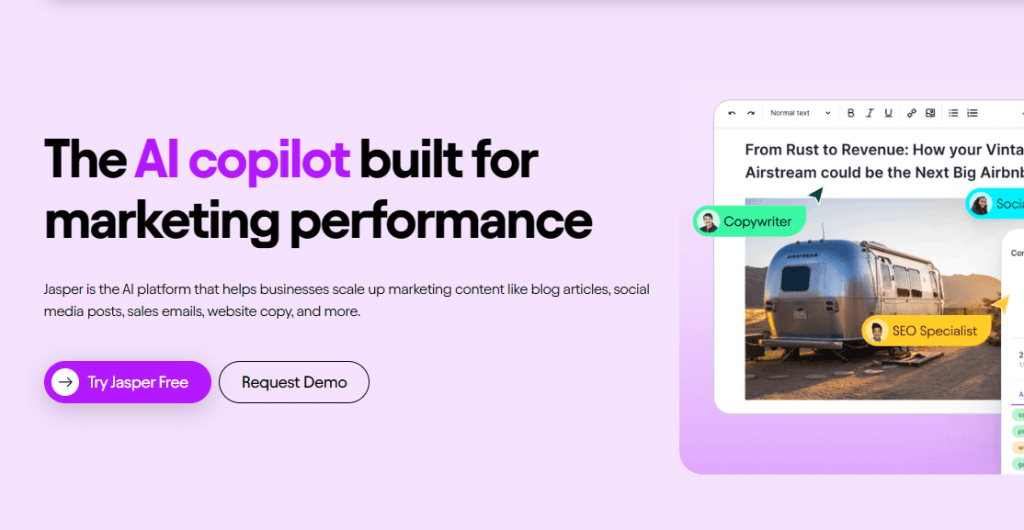In affiliate marketing, standing out and attracting high-quality, engaged leads is paramount. The conventional methods of offering free PLR eBooks or poorly constructed capture pages no longer cut it. Enter the power of mini-courses, a game-changing solution to this challenge.
But creating a mini-course that grabs your prospect’s attention, provides value, and compels them to beg for more, can be a daunting task. That’s where artificial intelligence (AI) comes into play as a course generator. AI dramatically shortens the time necessary to research and create these engaging mini-courses. Employing AI, affiliate marketers can deliver informative, captivating content that not only generates a solid lead but also paves the way for conversion.
The limitations of traditional marketing methods
Traditional marketing methods, while they have their own merits, inherently have certain limitations when it comes to affiliate marketing. For instance, the platforms used in traditional marketing – print media, television, radio, and direct mail – do not offer the same level of interactivity and engagement as digital channels. They are often one-way communication channels, with the advertiser speaking at the audience rather than having a conversation with them. Furthermore, it is difficult to measure the effectiveness and reach of these methods accurately due to the lack of precise tracking methods.

Lastly, traditional marketing methods can be expensive and time-consuming, with no guaranteed return on investment – a significant challenge, especially for affiliate marketers who typically operate on a performance-based compensation model. In contrast, digital marketing methods, such as mini-courses, can engage an audience interactively, build trust, and capture high-quality leads with a higher likelihood of conversion.
Low-quality vs. high-quality leads
The quality of leads can make or break success. High-quality leads are crucial because they represent an audience that is not only interested in the product or service being promoted but is also willing and ready to make a purchase. These are individuals who are engaged with your content, appreciate the value you provide, and are therefore more likely to trust your recommendations.
Low-quality leads, on the other hand, may express initial interest but ultimately do not convert into sales, resulting in wasted effort and resources. By focusing on quality over quantity, affiliate marketers can ensure a higher return on investment (ROI), building a strong and loyal customer base that drives consistent revenue.
What is a mini-course?
A mini-course is a condensed and highly focused online learning resource that provides valuable information on a specific topic. Typically, it is a self-paced learning module that consists of several bite-sized lessons designed to deliver tangible value to the learner in a relatively short amount of time. This could range from a few hours to a few days, depending on the complexity and depth of the subject matter. Mini-courses are designed to be engaging and interactive, often incorporating multimedia elements like videos, quizzes, and downloadable resources to enhance the learning experience. The concise nature of a mini-course enables the learner to quickly consume and apply the knowledge gained, making it an ideal lead magnet for affiliate marketers. The prospect receives valuable information for free or a nominal cost, and in return, the marketer captures the prospect’s contact information for further engagement and potential conversion.

Why are mini-courses effective lead magnets?
Mini-courses are incredibly effective lead magnets for several reasons. Firstly, they offer high-value content to the user. A mini-course is designed to teach something useful, providing value upfront and building trust with the prospect. This positions the marketer as an expert in their field, enhancing the prospect’s perception of them and the products or services they promote.
Secondly, mini-courses are engaging and interactive, making them more effective at capturing and holding the prospect’s attention compared to static content like eBooks or PDF reports. This high level of engagement increases the likelihood of the prospect completing the course and thus the likelihood of them providing their contact information and becoming a lead.
Finally, the structure of a mini-course lends itself to demonstrating the need for the product or service being promoted. Through the course, prospects can see first-hand the challenges or problems that the product or service can solve, making them more likely to make a purchase. Thus, mini-courses not only attract leads, they also precondition them toward conversion, making them a powerful tool for affiliate marketers.
Real Examples of Successful Mini-Courses
Consider two prime examples of successful mini-courses, which have proven to be highly effective lead magnets.
- ‘Productivity Hacks for Entrepreneurs’ by Tim Ferriss. This mini-course delivers practical tips that entrepreneurs can use to maximize their efficiency and productivity. Ferriss, being a successful entrepreneur and author himself, leverages his credibility and expertise to attract a highly targeted audience – aspiring and current entrepreneurs. The course is filled with actionable advice that encourages learners to implement the taught strategies, thus reinforcing the value they receive and amplifying the attraction of potential converting leads.
- ‘Basics of Digital Photography’ offered by PhotographyLife. This mini-course is designed for beginners who wish to learn the fundamentals of digital photography. By offering a step-by-step guide on mastering digital photography basics, the course provides immense value to photography enthusiasts. Not only does it attract leads to PhotographyLife’s site, but it also preconditions the learners to further engage with the site’s premium services, courses, and equipment reviews – a perfect example of the lead magnet potential of mini-courses.

Challenges of creating a mini-course manually
Creating a mini-course manually poses several challenges. Firstly, there is the issue of time and effort. Crafting a high-quality mini-course involves a multitude of steps including planning the course content, conducting in-depth research, creating engaging and educative content, and designing the course interface. This can be a lengthy and laborious process, particularly for marketers who may not have the luxury of time.
The second challenge is technical expertise. Building a mini-course requires not only subject matter expertise but also knowledge of digital content creation and learning management systems. The course must be easily accessible, visually appealing, and user-friendly to ensure an engaging and seamless learning experience for the prospect.
The third challenge is creating content that is both informative and engaging. This requires a deep understanding of the target audience’s needs, interests, and learning preferences. Striking the right balance between delivering value and promoting the affiliate product or service can be tricky. Too much promotional content can discourage prospects, while too little may not effectively demonstrate the product’s value.
The last challenge is the constant need for updating. Given the dynamic nature of the internet and user interests, the mini-course content needs to be regularly updated to stay relevant and effective. This again, demands significant time and effort.
To overcome these challenges, affiliate marketers can leverage artificial intelligence technologies to automate and streamline the process of mini-course creation. AI tools can assist with course design, content creation, and updating, thereby reducing the time and effort required and ensuring the delivery of high-quality, engaging mini-courses that serve as powerful lead magnets.

How AI can streamline the online course creation process
AI simplifies the course creation process in several ways. Firstly, an AI assistant can automate the planning and structuring of course content. They can analyze a vast amount of data, identify key topics based on the target audience’s preferences and trends, and then structure them into a comprehensive and logical course plan. This not only saves time but also ensures that the content is highly relevant and appealing to the intended users.
Secondly, AI can expedite the content creation process. AI-powered content generation tools can produce high-quality, informative content in a fraction of the time it would take a human. They can incorporate multimedia elements and promote interaction, making the course more engaging for the users.
Thirdly, AI can assist in the technical aspects of course creation. There are AI tools that can design user-friendly course interfaces, optimize them for various devices, and ensure easy navigation. This can significantly enhance the user experience, increasing the likelihood of course completion and lead conversion.
Lastly, AI can automate the process of updating the content. AI algorithms can monitor internet trends and user feedback and update accordingly. This ensures that the mini-course remains relevant and effective as a lead magnet. By leveraging an AI course creator, affiliate marketers can overcome the challenges of creating a mini-course manually and effectively utilize it as a powerful lead magnet.

Use Jasper as an AI course creator
- Establish course description and outline: Start by sketching out a basic course outline, including a description. Identify the key points you want to communicate to your audience and organize these into logical sections or chapters.
- Use Jasper for content creation: Navigate to Jasper and log into your account. Once logged in, choose “Long-Form Assistant” and input the title or topic of your section. For example, if you start with a course title like “Digital Marketing Basics,” input “Introduction to Digital Marketing.” Click “Generate content” and allow the tool to write a comprehensive and engaging section on your given topic.
- Review and edit content: Jasper creates high-quality, grammatically correct, and engaging content. However, it is important to review and adjust the content as needed to ensure it aligns with your course objectives and audience’s needs. You can easily edit the generated text within the tool.
- Repeat the process: Repeat steps 2 and 3 for each section or chapter of your course until your content is complete.
- Use Jasper for course updates: Utilize the “Blog Post Topic Ideas” feature to generate ideas for updating your course content. Input key terms related to your course and click “Generate ideas” to get a list of trending topics or new angles you could incorporate into your course.
- Export Content: Once you’re satisfied with the content, copy and paste it into your desired word processor (e.g., Word, Google Docs) and incorporate it into your Learning Management System or course platform.
- Monitor and Adjust: After launching your course, use the user feedback and engagement data to determine areas for improvement. You can then use Jasper to help revise or add content based on this feedback.
With Jasper, you have a tool that simplifies the process to build online courses. By leveraging artificial intelligence, you can focus less on content development and more on delivering value to your audience.

AI for course creation
Artificial intelligence holds immense potential to revolutionize online course creation. AI proves instrumental in identifying relevant and trending topics, expediting content creation, assisting in the technical design of courses, automating content updates, and personalizing learning experiences.
Several affiliate marketers have already tapped into the power of AI to streamline their mini-course creation process, with notable impacts on user engagement and lead conversion. Tools like Jasper further empower marketers in this journey by generating high-quality, engaging content, suggesting course updates, and facilitating the seamless export of content. Therefore, by harnessing AI, marketers can dedicate more time to value delivery and less on the intricate process of content creation.


